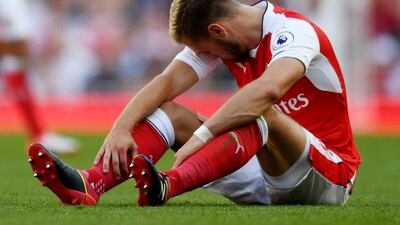Arsenal's generosity extends from offering up goals to opponents to providing obvious metaphors for everyone else.
Petr Cech drove into a pillar on his way out of the Emirates Stadium after defeat to Liverpool. It was a costly way of emphasising it had been a car crash of a day.
It was a busy occasion for anyone playing the unofficial game of Arsenal Bingo.
An opening-day defeat? Tick.
A side who looked unprepared for the start of the season? Tick.
A couple of callow players who seemed to be have been promoted too quickly? Tick. Naive defending? Tick.
A team weakened by injuries? Tick.
A strange omission from the side (in this case Granit Xhaka)? Tick.
A performance from Theo Walcott that lent itself to both criticism and praise? Tick.
Calls from fans to spend some money? Tick.
A comeback that enabled Arsene Wenger to claim his side showed their character? Tick.
Boos at the final whistle? Tick.
More Premier League
• Richard Jolly: Questions remain, but Jose Mourinho's Manchester United show they work on some level
• Thomas Woods: Erik Lamela shows hints of stardom for Tottenham Hotspur – PL talking points
• Greg Lea: 'Genius' Philippe Coutinho begins to dictate more than decorate for Liverpool
The scoreline seemed improbable but the events on the field felt depressingly predictable. Familiar problems recurred.
All it really lacked to be a quintessential modern-day Arsenal event was a role for Olivier Giroud in which he was either ineffective or guilty of a glaring miss.
Instead, the striker was afforded an extended break after Euro 2016, a logical move by the sports scientist in Wenger which then appears illogical when his other senior centre-backs are ruled out and Laurent Koscielny is sat in the stands while his team conceded four times.
In many ways, Arsenal out-Arsenalled themselves. It underlined the reality that an experienced central defender ought to have been signed earlier and that Wenger’s trademark faith in his own players, innate obstinacy and reluctance to pay over the odds can be a false economy while creating footballing problems.
On such occasions, admirable principles feel like misguided innocence.
Wenger's persona as the only rational individual in a Premier League notable for exaggeration and inflationary fees making him feel like a man out of time and place.
The Frenchman is right to argue that spending is not the panacea for all problems. Where he can be wrong is in when, and where, he sometimes does not spend.
Even if Valencia's German international defender Shkodran Mustafi does join, a six-pointer against potential rivals for an Uefa Champions League berth has already been lost.
While Xhaka’s cameo was notable for the sort of rash tackling that suggested he would have been at risk of a red card had he started, it still felt odd, and perhaps even self-defeating, that the second-most expensive player in Arsenal’s history was a substitute while Francis Coquelin and Mohamed Elneny, surely his inferiors, were preferred.
Wenger sometimes eases newcomers into the side – further evidence of his rational approach – but the fixture list meant Arsenal required a flying start.
The cost of Sunday’s reverse may only truly be apparent in May but cynicism and pessimism are sufficiently ingrained in the Arsenal psyche now that some in their fanbase will fear the worst.
The atmosphere made it easy to forget Arsenal finished second last season, yet it is impossible to ignore Wenger’s unblemished record of top-four finishes.
But it was one of those days where much that could go wrong did, where Wenger was left looking culpable, where the disconnect between the supporters and the powerbrokers was ever more apparent and where, in inimitable fashion, Arsenal left themselves playing catch-up from the start of the season.
But despite their capacity to muddle through and get around 70 points, year in year out, the probable improvement in other teams, as Liverpool illustrated, should mean they have less margin for error now.
Sooner or later, the harbingers of doom may be right. Arsenal’s Groundhog seasons may have a different ending, outside the top four.
Even if not, imperfect performances at the start of new reigns, such as those Manchester City and Everton delivered, are received differently.
Under other circumstances, Arsenal’s attacking threat might have been celebrated.
But not at this Arsenal, and not now, when the abiding image was of Cech’s car and the feeling that the entire team had driven into a pillar.
sports@thenational.ae
Follow us on Twitter @NatSportUAE
Like us on Facebook at facebook.com/TheNationalSport


